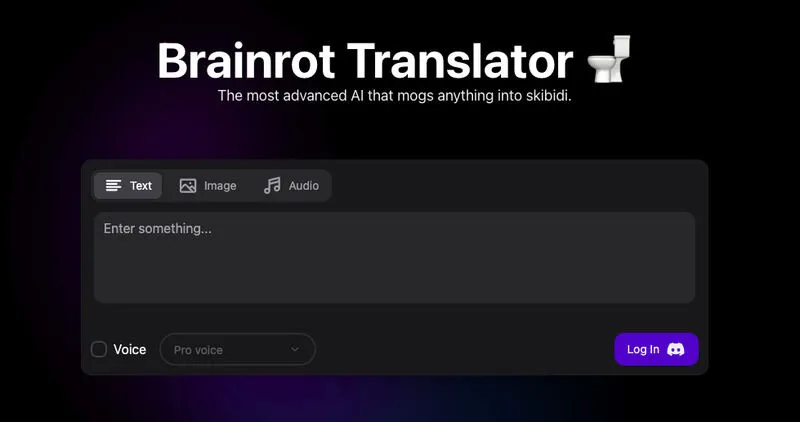
Brain Rot Translator
In the fast-paced, ever-evolving landscape of the internet, new slang and jargon emerge constantly, often baffling those who aren’t plugged into the latest trends. One phrase that’s surfaced recently is “brain rot,” and accompanying it is the curious term “brain rot translator.” What exactly does this mean, and why is it taking over online conversations, memes, and social media feeds? Let’s break down this phenomenon and explore how internet culture continues to redefine language and communication.
What is Brain Rot?
Before diving into what a “brain rot translator” is, it’s crucial to understand the core concept of “brain rot” in the context of online culture. The term “brain rot” is internet slang that refers to an obsession with something to the point where it occupies a significant portion of one’s thoughts, often in an unhealthy or overwhelming way. It can be an addictive TV show, a video game, or even a fandom that consumes your mental energy to such an extent that you feel your brain is “rotting” from it.
While it sounds negative, brain rot is often used in a semi-ironic or humorous way. People might say they have “brain rot” from binge-watching a Netflix series, scrolling endlessly on TikTok, or immersing themselves in a specific internet community. The phrase is less about actual harm and more about describing a state of mind where something frivolous becomes inescapably ingrained in your consciousness.
For example:
- “I can’t stop thinking about that new game. It’s giving me brain rot.”
- “After watching 15 episodes in a row, my brain is officially rotting.”
The Role of the “Brain Rot Translator”

Now, what exactly is a “brain rot translator,” and why do people talk about it? As the term “brain rot” became widely used across online communities, the need for a “brain rot translator” arose from the confusion surrounding heavily niche-specific language or meme references that only certain subcultures or fandoms understand.
A “brain rot translator” can be interpreted in two ways:
- Translating Internet-Specific or Fandom Language: It refers to the process of translating convoluted or overly specific language used in certain fandoms or internet subcultures into something comprehensible for those outside that group. For example, a group of gamers might constantly reference specific in-game terms, meme culture, or jokes from their favorite content creators. To an outsider, this might sound like complete nonsense, which is where a “brain rot translator” would come in handy to explain these inside jokes or terminology.
- Helping Interpret a “Brain Rot” Obsession: Another interpretation of a “brain rot translator” is explaining someone’s obsessive behavior toward a certain piece of media or fandom in more relatable terms. If your friend is constantly talking about a specific TV show or game, their comments might sound like a jumble of character names, references, and plot points that don’t make sense to you. A “brain rot translator” would be the guide that helps you understand the obsession and explains the inside jokes or why certain elements of that content are so captivating.
Brain Rot and Fandom Culture
The concept of “brain rot” is closely tied to fandom culture. In today’s digital landscape, fandoms around movies, books, TV shows, or video games are more immersive than ever before. Fans don’t just consume the content passively; they dive headfirst into it by creating fan art, fan fiction, memes, and deep discussions. The sense of community within fandoms creates an environment where in-depth analysis and niche references thrive, making it easy for fans to develop “brain rot” over their favorite media.
A popular example of brain rot in fandom culture might be the “Star Wars” fandom. People who immerse themselves in the lore, characters, and extended universe of “Star Wars” may constantly reference obscure characters, plotlines, or fan theories. To an outsider, hearing terms like “Clone Wars,” “Mandalorian,” or “The Force” can feel overwhelming or incomprehensible. This is where a “brain rot translator” (either a real person or a resource like a fan wiki) becomes crucial for understanding the nuances of the conversation.
The Humor Behind “Brain Rot Translator”
Like many terms in internet culture, the phrase “brain rot translator” is often used humorously. It acknowledges the absurdity of being so deeply involved in a niche that you need to “translate” your thoughts for others to understand. The humor comes from the fact that many of these interests, while entertaining and fun for those involved, often revolve around relatively trivial content.
For instance, someone might jokingly say, “I need a brain rot translator for my obsession with ‘The Office.'” The statement doesn’t literally mean their brain is deteriorating but highlights how the minutiae of their obsession—quoting lines, referencing obscure episodes, or creating in-jokes—has taken over their conversations.
Another example might be within the anime fandom, where shows are packed with Japanese terms, visual tropes, and character archetypes that outsiders may find confusing. An anime fan who binge-watches shows on a loop might say they have “brain rot,” and a “brain rot translator” could explain the meanings of certain anime genres, terms like “tsundere,” or why certain character designs are popular.
Brain Rot Translator Memes and Online Tools
In the world of memes, the idea of a “brain rot translator” has become a fun inside joke. Memes often reference how some online communities seem to speak their own language, whether it’s gamers, anime fans, or TikTok influencers. For example, a meme might show a confused person listening to someone talk about their latest obsession, with the caption, “I need a brain rot translator for this conversation.”
In some cases, actual tools or glossaries have been developed to act as “translators” for fandom or niche language. Websites like Urban Dictionary, fandom wikis, and online slang guides serve as resources for people who want to understand internet-specific language or meme culture. These tools can help bridge the gap between an insider and an outsider, acting as a “brain rot translator” in the most literal sense.
The Impact of “Brain Rot” on Communication
As lighthearted as the term “brain rot” may seem, it raises interesting questions about how the internet and media consumption are reshaping communication. We’re living in an age where binge-watching, social media scrolling, and meme-sharing have become part of everyday life. These habits can lead to fragmented attention spans and intense focus on niche content, which then impacts the way we communicate.
The language we use online often reflects our obsessions. When a significant portion of someone’s time is spent in a particular digital space—whether it’s a subreddit, a Discord server, or Twitter—it’s only natural that their conversations start to incorporate that language. In extreme cases, this could create communication barriers between different groups who don’t share the same online interests.
The “brain rot translator” concept, though humorous, highlights a real need in modern communication: the ability to bridge gaps between different internet subcultures and media-consuming communities. As our online lives become more segmented, the need for translating these niche conversations will likely grow.
Conclusion
In the grand tapestry of internet culture, the “brain rot translator” is a playful but insightful term. It reflects how deeply we can become engrossed in media and fandoms to the point where our thoughts seem incomprehensible to outsiders. Whether it’s used to explain complex internet slang or to bridge communication gaps between different fandoms, the “brain rot translator” represents how online culture continues to influence our language and interactions in increasingly fragmented ways.
So next time you hear someone say they’ve got “brain rot,” you might just need a translator—or perhaps, you’ll become the translator yourself.
For more information, visit our homepage!






2 thoughts on “Understanding the “Brain Rot Translator”: A Deep Dive into Internet Slang and Online Culture”